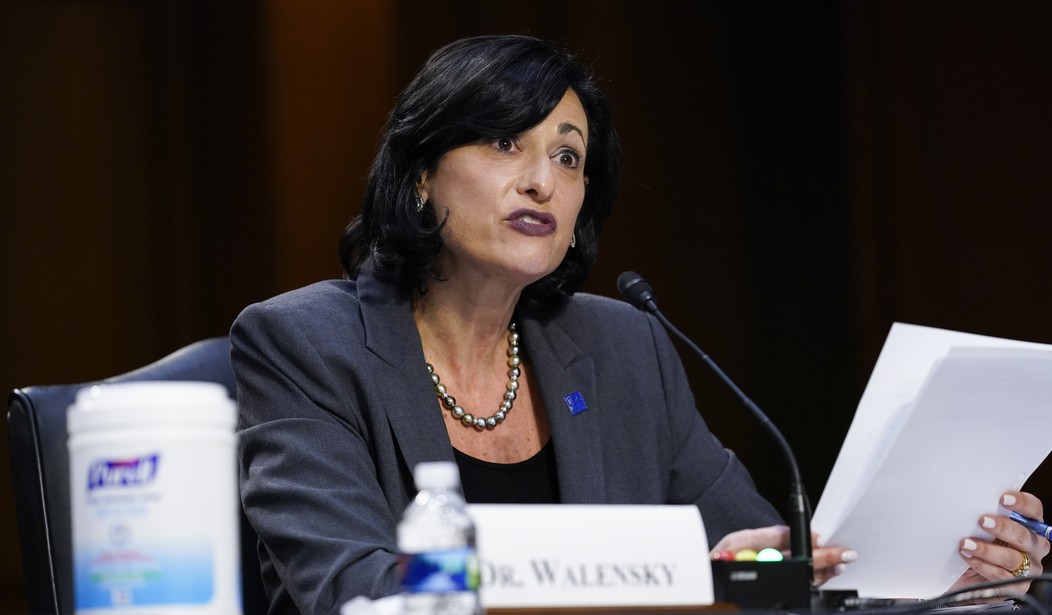“Two years in, now 750,000 confirmed new cases/day, record hospitalizations >140,000, many weeks after Omicron warning, and they’re still thinking about it,” Eric Topol tweeted in response to this scoop.
I honestly wonder if one of the reasons they’re holding off on recommending N95s is that they know they won’t have a good answer when they’re inevitably asked, “Why didn’t you recommend them a year ago?” It’s one thing for the feds to have downplayed N95s at the start of the pandemic, when they were in short supply, but the supply crunch eased some time ago.
They’ll probably say something like “Well, the previous strains weren’t as contagious as Omicron.” Right, but they were contagious enough. Delta, Alpha, and the original Wuhan strain sent 800,000 of us to the morgue. People like you and me who follow COVID news closely have known for awhile that N95s were superior but most Americans don’t follow it closely. Members of my own family who live in ground zero of the country’s Omicron outbreak, New York City, were under the impression until just a few weeks ago that their cloth masks were still decent protection against infection. Only a sustained messaging push by the feds will penetrate the public consciousness deeply enough to shift opinion. Where has that push been?
Why didn’t they start six weeks ago at the latest, when the threat of a global super-outbreak driven by Omicron had become clear in South Africa?
The Centers for Disease Control and Prevention is considering updating its mask guidance to recommend that people opt for the highly protective N95 or KN95 masks worn by health-care personnel, if they can do so consistently, said an official close to the deliberations who was not authorized to speak publicly…
When the CDC issued its initial mask guidance in 2020, health officials did not urge the use of the more protective face coverings out of concern that health workers might be unable to get them. But health officials said there are no longer serious shortages of N95 masks…
The agency’s current guidance says a mask should fit snugly, have two layers of breathable fabric and have a wire bridge around the nose. The guidance says N95 masks should be prioritized for health-care workers, an idea several public health experts panned.
“That note of trying to save N95s for health-care workers is just grossly out of date,” said Michael Osterholm, who leads the University of Minnesota’s Center for Infectious Disease Research and Policy and advised President Biden’s transition team on the coronavirus response.
Osterholm has been pushing N95 masks to replace cloth ones since July 2020, if not earlier. Cloth is better than nothing, he said at the time, but we can do better.
This morning Sanjay Gupta reminded CNN’s viewers that he asked Walensky about recommending N95s live on the air nearly a year ago. Skip to 4:45 and watch to the end to see what she said.
The Omicron variant is causing a significant spike hospitalization numbers across the US. “We’re likely to surpass” the last peak, @drsanjaygupta says. “In our…600-bed hospital, at our peak last year, 162 patients [were] in” with Covid-19, he adds. “Now, it is closer to 258.” pic.twitter.com/0kYERmKMtB
— New Day (@NewDay) January 11, 2022
That’s the public-health bureaucrat mentality in a nutshell, gaming out advice in anticipation of how the public might react instead of simply stating the science accurately. “You’re far, far better protected in an N95 than you are in a cloth mask,” the CDC could have announced last January. Many Americans would have upgraded immediately. Some who did would have found the mask uncomfortable but worn it anyway for safety reasons. Others might have found it so uncomfortable that they ended up ditching it — but how many would have gone barefaced instead of reverting to a cloth mask? Or even to a surgical mask, eyeing that as a healthy compromise between comfort and protection?
Her advice didn’t make sense on its own terms. But even if it had, it’s not her job to shade the guidance according to her pet theories of social psychology. Her job is to encourage best practices scientifically and hope that the public follows them. It’s a cinch that some elderly people have died this past year after being infected while wearing a thin cloth mask who would have survived if they’d been instructed to be sticklers for N95s.
I posted this graphic from the WSJ last week summarizing (pre-Omicron) data on infection but it’s worth posting again to show how stark the difference in protection is among different types of masks:

Night and day. Meanwhile, Walensky is on Capitol Hill today to answer Congress’s COVID questions and she’s … still not wearing an N95 herself.
.@CDCDirector going w double mask pic.twitter.com/c70BejNSGd
— Meg Tirrell (@megtirrell) January 11, 2022
Did she go with cloth because she feared the N95 would muffle her voice while speaking into the mic? Or does she feel obliged to model the (bad) guidance the CDC is still embracing on masks?
Why didn’t they do today’s hearing remotely anyway, given the high risk of Omicron infection on Capitol Hill?
Here’s Scott Gottlieb saying all that really needs to be said, and something I said myself recently. Whether we overhaul the CDC or add a new agency devoted to health communications with the public after the pandemic is over, something must be done. The CDC status quo is unacceptable. Too many failures.
.@ScottGottliebMD: “Ultimately we need to reform the @CDCgov, we need some kind of federal public health agency capable of doing this, but CDC was not that agency. It’s very hard for an agency to self organize in the setting of a crisis, and the CDC has been unable to do that." pic.twitter.com/r5ms0MBQic
— Tom Elliott (@tomselliott) January 11, 2022









Join the conversation as a VIP Member